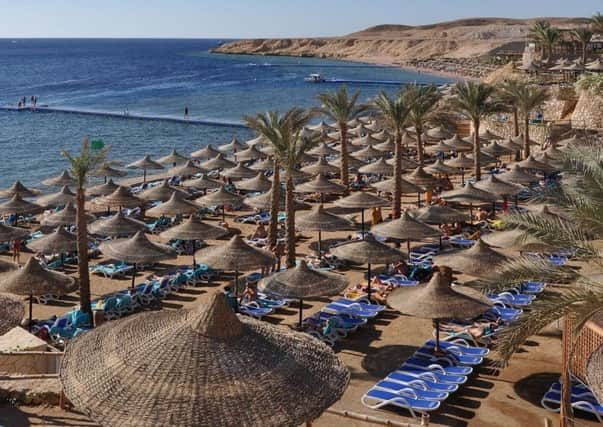Terror attacks: What does it mean for tourism abroad?


WITH the nights drawing in and the days getting colder and shorter, many people are starting to think about their summer holidays.
For a lot of us this conjures images of al fresco dining looking out over turquoise seas and golden, sun-kissed, beaches. Travelling abroad to exotic places has become the norm for many Britons, but this year a wave of terrorist attacks in popular holiday destinations has created an atmosphere of uncertainty and fear.
Advertisement
Hide AdAdvertisement
Hide AdIn March, an attack on the Bardo Museum in the Tunisian capital claimed the lives of 22 people and three months later 38 tourists, including 30 Britons, were massacred on a Tunisian beach.
Last month, 224 people were killed in what is believed to have been a terrorist plot to blow up the passenger plane that crashed in the Sinai after flying out of the Egyptian resort of Sharm el-Sheikh. Then we had the deadly attacks in Paris that left 130 people dead and many more injured.
The aim of terrorism is to instil fear in people so that they change their behaviour and these attacks are already having an impact on the tourism industry. Tunisian holidays still remain suspended for most markets, while airlines met with the Department of Transport this week to discuss flight bans to Sharm el-Sheikh following the suspected bombing of the Russian airliner.
British Airways has cancelled flights to the holiday resort up the middle of January and Easyjet services there are suspended until at least January 6.
Advertisement
Hide AdAdvertisement
Hide AdHolidaymakers are now starting to look at Turkey, a perennial favourite with many Britons, and question whether it is safe following October’s double bomb attack on a peace rally in Ankara that killed 99 people.
With Paris slowly recovering from the worst day of violence on French soil since the Second World War and the Belgian capital Brussels on high alert after spending the last four days in lockdown, it has left many people wondering, where next?
Paris will no doubt recover even if there is a short-term drop in visitor numbers, but for places like Sharm el-Sheikh and resorts in Tunisia and Turkey where many people’s livelihoods depend on tourism, the situation remains less certain.
Yeganeh Morakabati, an expert in risk and tourism at Bournemouth University, says terror attacks don’t necessarily have a big impact on tourism. “If it’s a one-off attack then people start to forget about it. After the 7/7 attacks in London there was very little impact on the number of visitors after a couple of months, and in Madrid in 2004 it was very similar.”
Advertisement
Hide AdAdvertisement
Hide AdHowever, the problem with the recent attacks is they happened in waves and targeted different places and people. “The volume of tourist flows has been incredibly resilient over the past century. But now we are effectively dealing with a breed of ‘humanity’ who are spreading fear across the world by targeting civilians and aiming to maximise fatalities. The recent terrorist’s attacks could be a tipping point in that respect,” says Morakabati.
The holiday market is fiercely competitive and if people don’t feel safe in one place they will go somewhere else and since the recent attacks, holidaymakers have been switching to destinations such as the Canary Islands, Cape Verde and long-haul resorts in search of winter sun.
The question that remains unanswered is what the longer term impact on travel and tourism will be. But this depends on how successful we are in the ongoing battle against IS and other terror organisations.
Morakabati says the impact of recent atrocities could be profound. “We will have to wait and see what happens, but it could be as significant as 9/11 in terms of how it changes the face of tourism.”